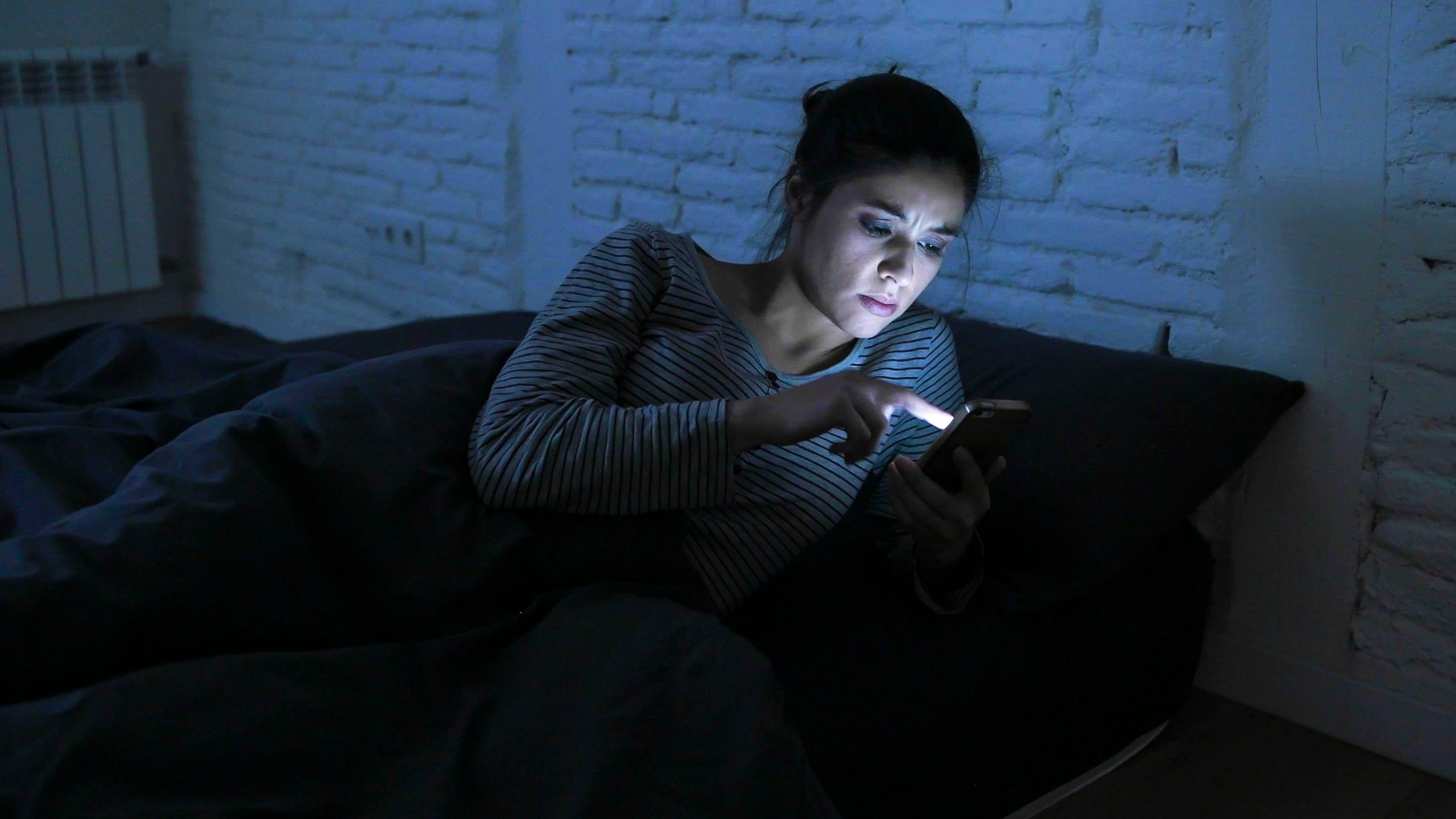Waking up at night is a problem everyone experiences at least once in their life.
For some, this is a rare occurrence that leaves you groggy and irritable the following day.
For others, continual nighttime awakenings can affect your mental and physical health.
Luckily, if you can identify the problem, you can solve it.
Read on to learn about the eight unexpected causes that may be waking you up in the middle of the night, and how you can remedy them for a full night’s rest.
Find You’re Constantly Waking Up at Night? Here’s Why.
Constantly waking up at night could be a result of your sleep environment or an underlying health issue.
Read on to see what may be causing restless sleep and tips to start sleeping through the night.
#1 – Do you have a regular sleep schedule?

Sticking to a regular sleep schedule is vital for a full night’s rest.
The circadian rhythm in your body is your natural sleep-wake cycle, sometimes known as your body clock. This is responsible for many important processes such as brain clarity and skin rejuvenation.
When this cycle is interrupted, it throws everything off-balance.
However, when you keep to a sleep schedule, you’ll get much higher quality deep sleep.
If you are waking up in the middle of the night due to an irregular sleep schedule, try keeping a sleep diary to track your snooze and your nocturnal awakenings.
For a quality sleep schedule that keeps night awakenings at bay, go to bed and wake-up around the same time every single day — even on the weekends.
You should also start good sleep hygiene practices such as wearing blue light glasses at night, practicing meditation before bed, and keeping to a relaxing bedtime routine.
#2 – Is your bladder waking you up at night?

If you get up to pee more than once during the night, you may have a condition called nocturia.
This is a common condition that develops with age. Recent studies show that nearly two-thirds of adults between 55 to 84 years of age get up at least two times a night to urinate.
Part of the reason is that the brain produces less of the antidiuretic hormone (ADH) as we age. This is the hormone responsible for water retention.
One way to alleviate nocturia is to stop drinking fluid at least two hours before bedtime.
Keep in mind that frequent nighttime urination could be a symptom of an underlying illness. Urinary tract infections, type 1 and 2 diabetes, bladder inflammation, and heart disease can all cause you to pee multiple times throughout the night.
If you think your frequent midnight pee trips are due to more than age and water, contact your doctor.
#3 – Do you have a poor sleep environment?

If you are having trouble staying asleep, it may be because of a poor sleep environment.
Your electronic devices will disturb your nights if they’re not on sleep mode. Likewise, if your cell phone screen lights up when you receive a notification, this may also wake you.
The temperature at which you sleep also plays a factor in your rest. The thermoregulation part of the brain works with the sleep-wake cycle to keep the internal clock in check by lowering the body temperature. If it’s too hot, you’ll wake up.
To combat this, keep your thermostat set between 60 and 70 degrees during the night.
Ambient noise can also wake you up at night. If you are a lighter sleeper, wear earplugs to block out noise.
Pet owners should consider shutting their furry friend out of the room or finding a toy or blanket to keep them quiet at night. While it might be comforting to have your pet in the bed, studies show pets in the bed lead to increased human movement, disrupting your sleep.
A dark bedroom provides better sleep conditions. Try blackout curtains or a sleep mask to reduce light disturbances.
#4 – Is your mental health waking you up?

If you are struggling with mental health, your sleep is likely to suffer.
Sleep issues are common symptoms of depression and anxiety disorders. Both disorders can prevent you from entering deep REM sleep and thus keep you alert and restless throughout the night.
However, even without a diagnosed mental health disorder, your mental health may still disrupt your sleep from time to time.
For example, nights with bad sleep may lead to underlying anxiety that following nights will continue to produce poor sleep. This cycle can continue until you feel like you have no control over it.
If continuous insomnia is causing you anxiety, try Acceptance and Commitment Therapy (ACT), a technique created by renowned sleep expert, Dr. Guy Meadows.
This technique recommends acknowledging your insomnia and accepting it, rather than trying to fight it.
“Clients say they struggle to sleep all night then finally fall asleep at 6:30 AM when they give up,” Dr. Meadows states.
This ‘giving up’ is your mind’s acceptance of your sleep problem. By acknowledging the issue, you overcome it.
#5 – Are you eating in the hours before bedtime?

Is it bad to eat right before bed?
Depending on what you eat: yes.
According to specialist sports nutritionist, Pamela Bede,
“A general recommendation is to stop eating about two hours before bed to give your body time to digest and work off some of that energy. But if you’re hungry, you need to answer that call.”
In this case, look for foods that aid the production of melatonin, such as magnesium-rich fruits (like bananas) and nuts.
Do not overindulge. A full stomach and indigestion may cause you to wake in the middle of REM sleep.
Foods that are sugary or contain a high-fat content counter sleep because they promote energy and brain stimulation.
To ensure a full night’s rest, avoid processed foods and artificial sugar late at night.
If you struggle with insomnia, lay off caffeine after midday. Limit yourself to just one cup a day for at least two weeks until you start to form a regular sleep pattern.
#6 – Do you regularly drink alcohol before bed?

If you regularly drink alcohol before bed, you may find that you wake up each morning feeling drained and sluggish.
While a nightcap may help you fall asleep, it disrupts the second stage of your REM sleep cycle.
This is because liquor is absorbed through the body slowly. This means that while you’re sleeping, your body is still metabolizing the booze.
At the same time, alcohol slows your reflexes and muscle movements, such as your throat muscles. This can cause breathing restrictions and coughing or choking, which wakes you.
Researchers have determined that regular alcohol consumption raises the probability of developing sleep apnea by 25%.
To prevent insomnia due to alcohol, stop drinking at least two to three hours before bed. Do not drink excessively and avoid passing out drunk.
#7 – Are you just getting older?

Sleep patterns change with age.
Babies can drift off even when there are loud noises, but adults often struggle in dark, quiet bedrooms.
The human body produces less melatonin as we age, which affects the hours of sleep we get each night.
Adults are also more likely to be taking medications that cause sleep disorders such as insomnia, Restless Legs Syndrome, and fragmented sleep.
Obstructive sleep apnea develops with age, and you should consult a doctor if you think this is the case.
Research also shows that older people suffer from more fragmented sleep and are more likely to be woken by external stimuli, like light and sounds.
Remedies for age-related sleep problems include limiting your screen time two to three hours before bed and drinking warm milk or chamomile tea.
#8 – Are you waking up at night from night terrors?

Night terrors in adults are often a symptom of trauma.
These are scary events that cause extreme physical reactions such as screaming, sweating, pale skin, and uncontrollable shaking.
They are sometimes misdiagnosed as nightmares.
One way to tell if you’ve had a night terror versus a nightmare is that night terrors are hard to wake up from, whereas nightmares will cause you to wake immediately.
People with night terrors typically wake just once during the night and are unable to fall asleep again due to increased anxiety and fear.
When you wake in a panic during the night, try progressive muscle relaxation or deep breathing exercises to calm yourself. This is a stress relief method where you tense and hold your muscles as you breathe in, and then release everything as you breathe out.
As stated, night terrors in adults are usually the result of trauma, but they can also be due to medication you’re using for a different health condition. So, if you have frequent night terrors, contact a mental health professional.
In Summary
Now you have a better idea of why you’re waking up at night, you can take steps to alleviate the problem and get better shut-eye.
If you like a glass of wine before bed, try switching it out for a sleepy mug of herbal tea instead.
If street noises cause you to stir, install a fan or white noise machine to block out any sleep disturbances. Likewise, try an eye mask to keep out light pollution.
A good night’s sleep is the best solution for a good day. If you need more help to sleep through the night, check out more of our articles here.

Welcome to Snoozerville! I’m Dr. Alex Hartley, your guide to the world of restful sleep. With a Ph.D. in Sleep Science and years of experience as a sleep therapist, I’ve dedicated my life to understanding and improving sleep quality. My passion lies in uncovering the mysteries of sleep and sharing practical, science-backed advice to help you achieve the best rest possible. Beyond my academic pursuits, I’m an advocate for mindfulness and relaxation techniques, which I incorporate into my daily routine. At Snoozerville, I aim to transform your nights, combining the latest research with easy-to-implement tips. Whether you’re a chronic insomniac or just looking to improve your sleep hygiene, join me on this journey towards peaceful, rejuvenating sleep.

